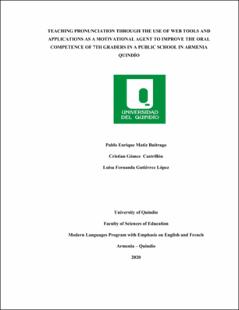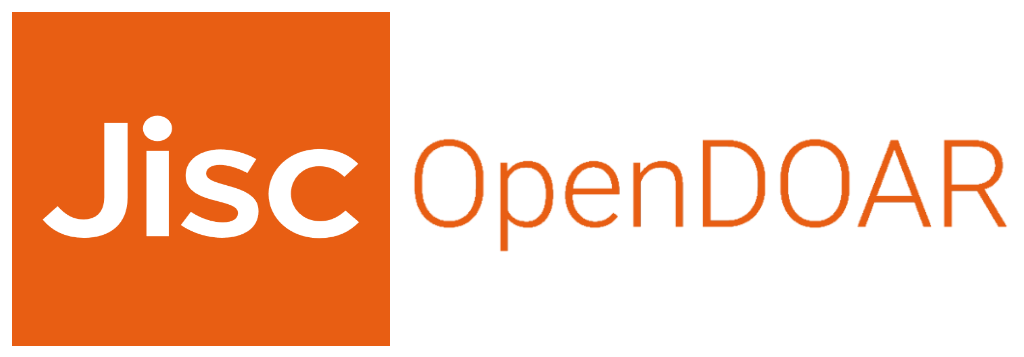Mostrar el registro sencillo del ítem
Teaching pronunciation through the use of web tools and applications as a motivational agent to improve the oral competence of 7th graders in a public school in Armenia Quindío
| dc.contributor.advisor | Alzate Ortiz, Paola | |
| dc.contributor.author | Matiz Buitrago, Pablo Enrique | |
| dc.contributor.author | Gómez Castrillón, Cristian | |
| dc.contributor.author | Gutiérrez López, Luisa Fernanda | |
| dc.date.accessioned | 2023-01-31T21:30:05Z | |
| dc.date.available | 2023-01-31T21:30:05Z | |
| dc.date.issued | 2020-06-06 | |
| dc.identifier.uri | https://bdigital.uniquindio.edu.co/handle/001/6302 | |
| dc.description.abstract | Currently, globalization plays a fundamental basis in the economic, political and social development of a country. That is how, the interest of establishing English as a lingua franca has become a fundamental pillar for the governments around the world. In this sense, the Colombian Ministry of Education, in its Bilingual Program created in 2004, started the dream of developing biculturality to be able to face the new challenge of breaking the barriers of communication among speakers of different cultures. In fact, the relevance of speaking English as a second language requires the development of the communicative competences which are reading, writing, listening and speaking. When talking about the last one, pronunciation plays an important role because if it is not well approached, students can feel insecure of speaking without knowing how to pronounce a word correctly. As a result, their motivation to produce orally is negatively affected. According to Folse and Ivone (2005) (as cited in Fernandez 2008, p. 5) “some students are good at speaking in a natural way and tend to participate in all conversation exercises, while others can be quiet and reserved”. It means there is still a notable difference between the input the students receive and the output the students produce. In other words, many students are able to understand the English language, but they are still unable to speak it in the local context. | eng |
| dc.description.tableofcontents | Introduction | eng |
| dc.description.tableofcontents | Problem statement | eng |
| dc.description.tableofcontents | Justification | eng |
| dc.format.mimetype | application/pdf | spa |
| dc.rights | Derechos reservados Universidad del Quindío | spa |
| dc.rights.uri | https://creativecommons.org/licenses/by-nc-nd/4.0/ | spa |
| dc.title | Teaching pronunciation through the use of web tools and applications as a motivational agent to improve the oral competence of 7th graders in a public school in Armenia Quindío | eng |
| dc.type | Trabajo de grado - Pregrado | spa |
| dc.rights.accessrights | info:eu-repo/semantics/openAccess | spa |
| dc.rights.creativecommons | Atribución-NoComercial-SinDerivadas 4.0 Internacional (CC BY-NC-ND 4.0) | spa |
| dc.type.coar | http://purl.org/coar/resource_type/c_7a1f | spa |
| dc.type.driver | info:eu-repo/semantics/bachelorThesis | spa |
| dc.type.version | info:eu-repo/semantics/publishedVersion | spa |
| dc.relation.references | Alizadeh, M.. (November 18, 2016). The Impact of Motivation on English Language Learning. International Journal of Research in English Education, 1, 12. 2020, febrero 16, Recuperado de http://ijreeonline.com/article-1-23-en.pdf | spa |
| dc.relation.references | Altablero. (Octubre,Diciembre de 2005). Bases para una nación bilingüe y competitiva. Altablero | spa |
| dc.relation.references | Bagarić, V. (2017).Defining communicative competence, Metodika 8(1).Retrieved from Bagaric_i_Mihaljevic_Djigunovic_ENG%20(1).pdf | spa |
| dc.description.degreelevel | Pregrado | spa |
| dc.description.degreename | Licenciado en Lenguas Modernas | spa |
| dc.publisher.faculty | Facultad de Ciencias de la Educación | spa |
| dc.publisher.place | Armenia, Quindío | spa |
| dc.publisher.program | Educación - Licenciatura en Lenguas Modernas | spa |
| dc.type.content | Text | spa |
| dc.type.redcol | https://purl.org/redcol/resource_type/TP | spa |
| dc.type.coarversion | http://purl.org/coar/version/c_fa2ee174bc00049f | spa |
| dc.rights.coar | http://purl.org/coar/access_right/c_abf2 | spa |














